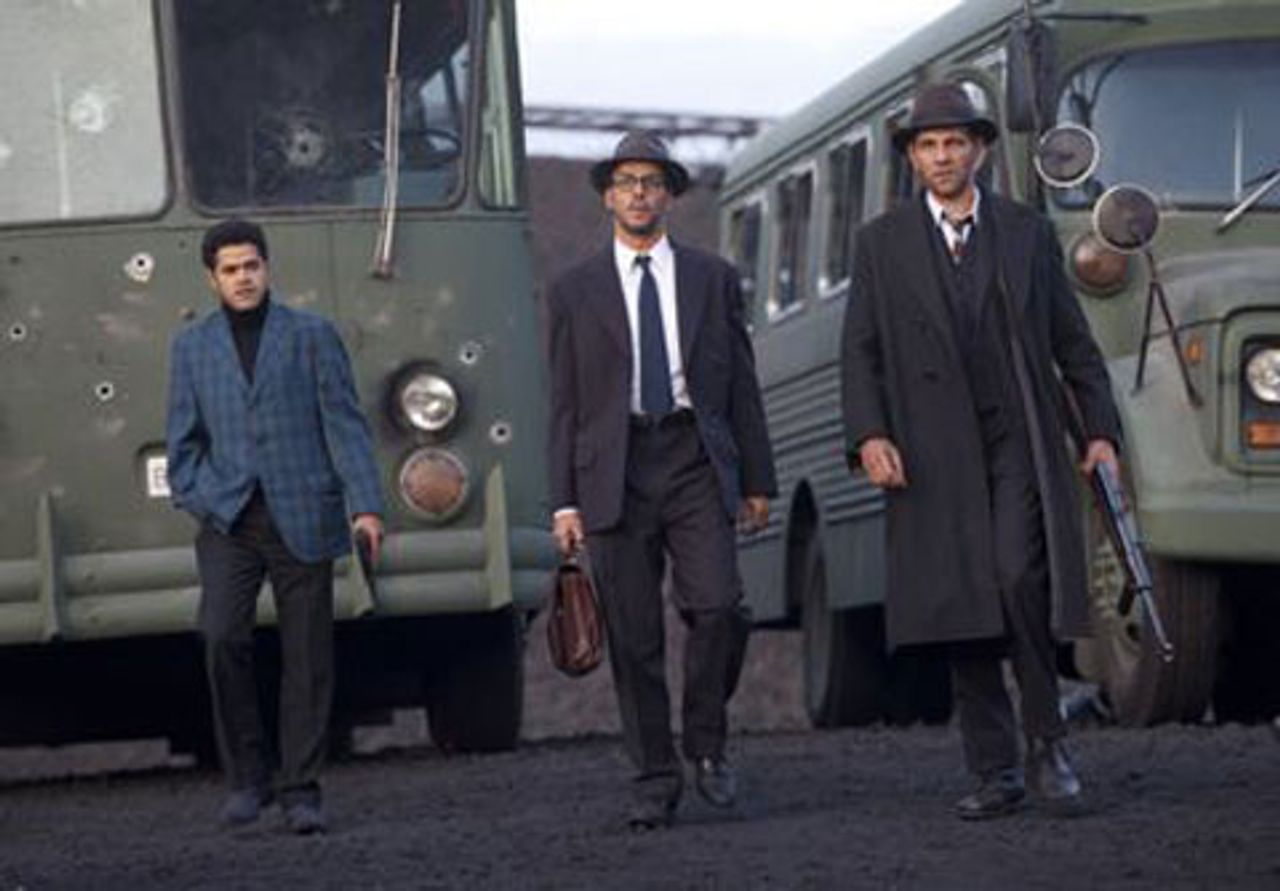The Academy Award nominations for 2010 were announced Tuesday morning at a press conference in Los Angeles. The 83rd Academy Awards ceremony will take place February 27 at the Kodak Theatre, also in Los Angeles, co-hosted by actors James Franco and Anne Hathaway.
The King’s Speech, directed by Tom Hooper and featuring Colin Firth, Helena Bonham Carter and Geoffrey Rush, gained the most nominations for 2010, 12, including nominations in nearly all the leading categories.
The Coen brothers’ True Grit gained recognition in ten categories, while Christopher Nolan’s Inception and David Fincher’s The Social Network were each nominated for eight awards.
Two films that provided some sense of contemporary American life, The Fighter and Winter’s Bone, received seven and four nominations, respectively.
 Winter's Bone
Winter's BoneThe Academy Awards process, like a good many social events in the US at this point, has a largely ritualistic character. Very little is left to chance, either in the nomination process or the ceremony itself.
The last time controversy was permitted to rear its head came in March 2003, only days after the launching of the US-led assault on Iraq, when documentary filmmaker Michael Moore denounced George W. Bush, calling him a “fictitious president,” and declared, “We are against this war.” Since that time, the awards ceremony has run as smoothly and tediously, sometimes as unendurably, as clockwork.
The nominations this year, whether or not this has any genuine and lasting significance, are a slight improvement over last year’s selections, which included the dreadful leading quartet of Avatar (directed by James Cameron), The Hurt Locker (Kathryn Bigelow), Inglourious Basterds (Quentin Tarantino) and Precious (Lee Daniels).
The King’s Speech follows the painful efforts of “Bertie” (Colin Firth), as he is known to his family, son of Britain’s King George V (Michael Gambon), to rid himself of a serious speech impediment. When Bertie is suddenly crowned King George VI in December 1936, after the abdication of his elder brother Edward VIII (Guy Pearce), his wife Elizabeth (Helena Bonham Carter) enlists the aid of an unorthodox speech therapist, Australian-born Lionel Logue (Geoffrey Rush).
The film treats its subject matter with some degree of sensitivity and sympathy, and all its leading performers are talented and appealing individuals. George V and Edward VIII, the latter infamous for his racist and pro-Nazi views, are painted in unattractive colors, and Logue is relatively disrespectful to the monarchy and its various Neolithic features.
However, the overall impulses of The King’s Speech are to a high degree conventional and conformist. It accepts the quasi-official version of events less critically and questioningly than Stephen Frears’ The Queen (2006), for example. As the production notes explain, with Britain standing “on the brink of war and in desperate need of a leader,” the film shows how “the King will overcome his stammer and deliver a radio-address that inspires his people and unites them in battle.” There is nothing especially unexpected or illuminating in that.
As noted above, Winter’s Bone (directed by Debra Granik—see WSWS interview) and The Fighter (David O. Russell) provide compassionate glimpses, or more, of the economically and psychically desperate circumstances under which so many live in the US.
 The Fighter
The FighterInside Job (Charles Ferguson), which provides a useful, if limited, picture of the financial malfeasance that went on before and after the September 2008 crash, has been nominated in the feature documentary category (see WSWS review), along with the noncommittal Restrepo (Tim Hetherington and Sebastian Junger—see San Francisco International Film Festival 2010 Part 3: War, and more war), about the Afghan war.
From Algeria, Outside the Law (Hors-la-loi), directed by Rachid Bouchareb, (“a taut, epic story of three brothers whose lives unfold during the struggle for Algerian independence”— see Walking around and near the problems) is a worthy effort.
 Outside the Law (Hors la loi)
Outside the Law (Hors la loi)British filmmaker Mike Leigh has been nominated for his original screenplay for Another Year, a relatively routine and toothless work, although with endearing and moving moments.
Aside from that, there is not much. The Social Network celebrates the “rebel” capitalism of the 1990s at a time when the American profit system is distributing social misery on an unprecedented scale. The Kids Are All Right (Lisa Cholodenko) has pleasing and amusing moments, but in the end seems principally concerned with defending the complacent upper middle class from threatening realities.
Britain’s Christopher Nolan (Inception) is a filmmaker possessed of considerable ingenuity and clever ideas, but apparently nothing of importance to communicate. Black Swan is another overwrought work from Darren Aronofsky, and True Grit a slight one from the Coen brothers.
Numerous talented actors are nominated, including Franco, Firth, Rush, Javier Bardem, Jeff Bridges, Christian Bale, Mark Ruffalo, Jennifer Lawrence, Natalie Portman, Michelle Williams (for the murky and contrived Blue Valentine), Amy Adams and Melissa Leo, along, no doubt, with many skilled cinematographers, film editors, makeup artists, costume designers, sound mixers and more.
In general, there is no lack of talent in Hollywood or global cinema as a whole. The essential problems lie in the film world’s distance from contemporary life and its complexities. Most films do not tell the important truths, or tell them elegantly or poetically. As a result, their immediate impact is weak and they have little enduring power. Artistically, these are some of the worst of times.
If one were to judge American filmmakers as a social grouping by the reality they represent on screen, it would seem by and large that they have sizeable houses, new cars and lives free of economic worry. If this is so, that puts them at an artistic and social disadvantage when it comes to examining and reproducing American and global conditions of life.
For many in the upper echelons of the film world, this is the best of times. In 2010 Warner Bros and Fox led the studios in success at the global box office, with $2.93 billion and $2.90 billion in international grosses, respectively, followed by Disney with a best ever $2.3 billion, Paramount ($1.98 billion), Sony ($1.38 billion) and Universal ($1.2 billion.) Warners claimed it set an industry record last year by reaching $4.81 billion in worldwide ticket sales.
The American film industry has a virtual stranglehold on the global market, far out of proportion to the quality of its products.
Much of the US film industry’s massive revenue comes from increased ticket prices (as well as the increasing importance of overseas box office receipts—of a staggering $29.9 billion American distributors took in at theaters worldwide in 2009, $19.3 billion was made outside the US). The industry earned a total domestic gross of $10.57 billion in 2010, almost unchanged from 2009, but US ticket sales fell by nearly 6 percent from the year before. In fact, the figure of 1.329 billion tickets sold last year in the US is the lowest since 1995—but the cost of an average movie ticket jumped by 45 percent over that 15-year period.
We await the Academy Awards ceremony February 27 without great expectations—or much enthusiasm.
The author also recommends:
Darren Aronofsky’s Black Swan: A portrait of the artist as a tormented young woman
[18 December 2010]
David O. Russell’s The Fighter: “Big-hearted” people treated seriously
[11 January 2011]
Inception: But where are the ideas?
[3 August 2010]
The Kids Are All Right: Circling the wagons
[6 September 2010]
The Social Network: “Dot-com” myth-making
[15 October 2010]
True Grit, a revenge tale from the Coen brothers
[25 January 2011]
An Ozark noir: Winter’s Bone
[29 June 2010]
